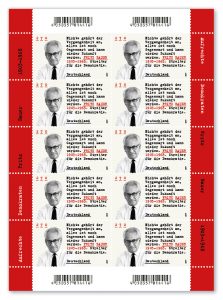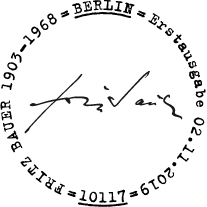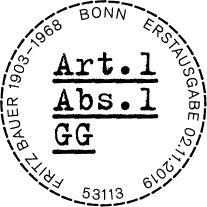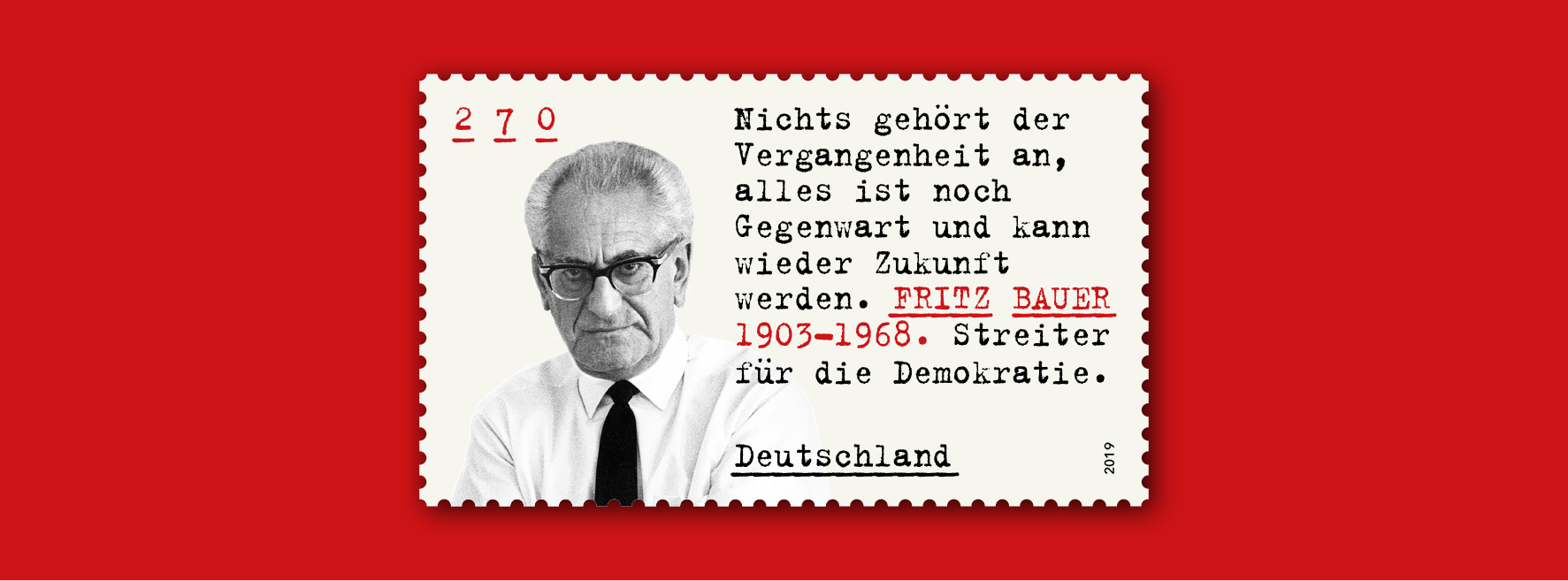02.11.2019
Fritz Bauer stamp issued
In the series of true democrats
 A few years ago, the late Prof. Dr. Erardo Rautenberg, Attorney General of the State of Brandenburg, advocated the appearance of a stamp remembering the lawyer and human rights advocate Dr. Fritz Bauer. The attorney initially met with rejection for his request. However, last year – Erardo Rautenberg still heard about it – his request was heard and the Fritz Bauer stamp will be on sale from today, 2 November 2019.
A few years ago, the late Prof. Dr. Erardo Rautenberg, Attorney General of the State of Brandenburg, advocated the appearance of a stamp remembering the lawyer and human rights advocate Dr. Fritz Bauer. The attorney initially met with rejection for his request. However, last year – Erardo Rautenberg still heard about it – his request was heard and the Fritz Bauer stamp will be on sale from today, 2 November 2019.
It is said that the stamp’s circulation of 2.70 euros for large letters is high, which comforts the fact that it has not become an 80 cent stamp that would probably take more people into its hands.
In any case, the lucidity of the stamp designed by Cologne designer Detlef Behr has been more than successful. The portrait of the Munich photographer Stefan Moses (1928-2018), who at the time took several portrait photographs of Fritz Bauer in his office at the Frankfurt Attorney General’s Office, contributes to this. These are probably the best-known images of this important lawyer, who is rewarded for his efforts by the state with a stamp that was not granted to him throughout his life.
However, Dr. Fritz Bauer could hardly have longed for such an award at that time. After all, he had to constantly fight against the fact that his efforts for historical truth and a legal presentiment of Nazi crimes bounced off the unwillingness of the by no means denazified judiciary and a policy that courted voters first and foremost and wanted to leave the past behind as quickly as possible.
All the more apt is the quote by Fritz Bauer chosen for the stamp: “Nothing belongs to the past, everything is still the present and can become the future again”.
Especially in the current situation, where the “uneasiness” (Aleida Assmann) and the question marks are growing in the frequently quoted success story of German national remembrance culture, this quote is well chosen. It illustrates the concern of the jurist Fritz Bauer not to be satisfied with merely remembering the crimes of the Nazis and the innumerable victims, but to be always and constantly vigilant and combatants for the defense of our democracy.
Fritz Bauer was a resistance fighter and survivor who made the ” struggle for human rights ” (the title of his only autobiographical essay) his own on the basis of enough bitter experiences. As a Social Democrat, the Nazis immediately threw him into a concentration camp in 1933 and persecuted him for their racist “legislation,” against which Bauer later described fighting as the right and duty of every German. “You should have said no,” was his conclusion and the task he not only gave his contemporaries along the way.
Fifty years after he died an unexplained death, the concern of the lawyer and philanthropist is just as great a challenge as it was when he wrote it in our history book. Nothing belongs to the past…


Author: Dr. Irmtrud Wojak
Contact: info@fritz-bauer-blog.de
Official text on the Website of the Bundesfinanzministerium:
November 2019 (02.11.2019)
»Ich bin 1949 aus der Emigration zurückgekehrt, um – im Rahmen des mir vielleicht Möglichen – etwas für den Menschen und die Menschen zu tun«. Der Jurist Fritz Bauer, der dies in einem privaten Brief Anfang der sechziger Jahre schrieb, meinte damit sein Mitwirken an der Demokratisierung der neu gegründeten Bundesrepublik. Nur durch die Konfrontation mit den Verbrechen des Nationalsozialismus, so seine Überzeugung, konnten demokratisches Bewusstsein und eine demokratische Justiz im Land entstehen. Sowohl in Braunschweig als auch später in Frankfurt am Main ließ Bauer in seiner Funktion als Generalstaatsanwalt den ersten Artikel des Grundgesetzes an die Fassade der Justizgebäude anbringen: »Die Würde des Menschen ist unantastbar.« Im Gesetzestext heißt es weiter: »Sie zu achten und zu schützen ist Verpflichtung aller staatlichen Gewalt.« Bauer sah seine Aufgabe darin, die Bürger vor Übergriffen des Staates zu bewahren. Als Sozialdemokrat und Jude hatte er die Verfolgung im Nationalsozialismus selbst erfahren. Die Demokratisierung der west-deutschen Gesellschaft konnte nach seiner Auffassung nur gelingen, wenn sich der Einzelne aktiv für sie einsetzte. Als wesentlicher Initiator des großen Frankfurter Auschwitz-Prozesses (1963 – 1965) ging Fritz Bauer in die Geschichte ein. Stets betonte er, dass er nicht die Vergangenheit, sondern vielmehr Gegenwart und Zukunft im Blick habe. Für Recht und Demokratie stritt Fritz Bauer unermüdlich.
Gestaltung Postwertzeichen:
Detlef Behr, Köln
Fotografie: stefan moses | © stefan moses archiv
Wert: 270 Cent






